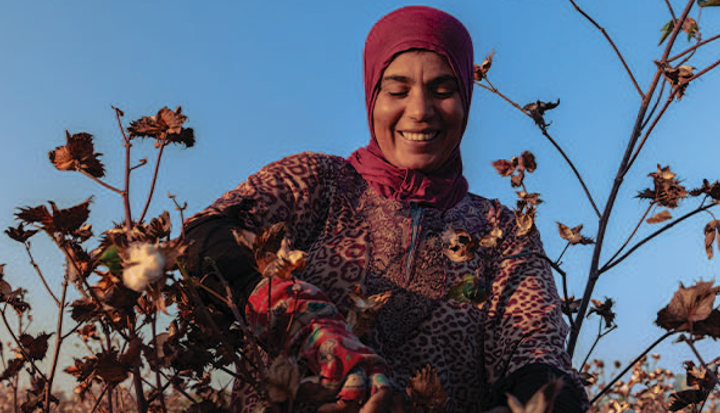Kaumudiben Satishbhai Tadvi hails from the Vyadhar Village nestled in the district of Gujarat, on the western coast of India. Here, she works diligently alongside her family to sow and harvest cotton, while also cultivating pigeon peas and practicing animal husbandry. In recent years, she has witnessed a rise in unpredictable rainfall, strong winds and heavy fog brought about by climate change which have significantly impacted the overall quality and quantity of her crop yields. It’s an issue not unfamiliar to the millions of farmers across the country and indeed, the world; but one that often hits women farmers the hardest.
There are an estimated 31.5 million farmers who grow cotton globally, of which nearly half (46%) are women. Contrary to popular belief, these women are actively engaged throughout the fibre’s cultivation process and are fundamental to the sector’s success. In some regions, men have flocked to the cities in pursuit of improved livelihoods, leaving women to take on the role of ‘lead farmer’. Yet, time and again, this critical role goes unrecognised.
Cultural norms, rooted in patriarchal values, can in many cases impose limits on women farmers’ decision-making power and rob them of rightful land ownership. The generalisation of women as ‘farm hands’, taking a peripheral role in the fields, has led to the concentration of resources and training among male farmers. Climate change only serves to exacerbate the situation further, not only by diminishing their livelihoods but by increasing their workload. In addition to managing the farm, women often bear the burden of household duties – providing their families with food, water and firewood for cooking and home use. All these resources inevitably become harder to deliver when faced with extreme weather conditions.
With that being said, the position of women at the frontlines of the climate crisis also means they are well-placed to facilitate change. Their experiences can inform the most effective strategies for responsible resource consumption and climate resilience. Moreover, by tapping into their unique indigenous knowledge, our society can learn to work with, and not against, nature.
At CottonConnect, we have long championed women farmers and believe they have a critical part to play at the helm of climate action. Over the last decade, we have supported hundreds of thousands of women farmers through our Women in Cotton programme – more than 270,000 in 2023 – 2024 alone. The programme provides training in literacy, numeracy and business management, worker rights and regenerative farming practices. In this way, giving them the tools to own their narrative and contribute to the solution, as opposed to falling victim to the effects of climate change.
To better understand the impact of our training, we recently spoke directly with the women who have participated in our programme across India, Pakistan, Egypt and Bangladesh via focus group discussions and a stakeholder roundtable. The insights of which have been compiled into a new report, titled Women in Cotton – Experiences from Women Mitigating the Effects of Climate Change. It rapidly became evident that incorporating women in climate training programmes not only benefits them but has a positive ripple effect on their communities and the sector’s sustainability ambitions.
One of the most striking revelations from working with the women in the earlier days was their limited understanding of climate change. In fact, a farmer explained that for years, it was seen as ‘divine punishment rather than a scientifically explainable phenomenon’; let alone one that could be influenced by our actions. Through training, we have been able to help shift this perspective as well as equip women with skills in climate-smart agriculture to proactively and rationally mitigate the impacts of climate change. Importantly, we have created advocates for environmental conservation. To date, we have trained 42 women in Gujarat through our Women Climate Change Ambassador programme. Each of these individuals have since trained 30 farmers each, imparting knowledge to over 1,200 women.
Specialist training has also enhanced women’s economic resilience and income. By adopting regenerative farming practices such as intercropping, agroforestry and the use of biofertilizers, they can better maintain the health and productivity of their farms. In some instances, even earn supplemental income through the alternative crops yielded or bio-inputs they make. The combination of this new-found knowledge and income, in turn, boosts their confidence and strengthens their role in the community.
Kaumudiben shares: “As a woman farmer, I’ve seen our contributions to farming and climate action being recognised more by our families and communities. Although change is slow, we’re taking on more decision-making. Men are beginning to respect our roles, and we’re gaining visibility as leaders.”
There are also significant advantages to public health as result of the climate-friendly practices championed by these women. Farmers and local communities are far less exposed to harmful chemical pesticides and fertilisers, thanks to the use of natural pest control methods. Agroforestry has provided natural air purification and cooling shade for areas prone to extreme heat. Meanwhile, intercropping and cover cropping offers a variety of nutritious food options for families. Together, these shifts in behaviour creates farms that can more easily cope with unpredictable weather, and that reassurance can do wonders in supporting farmers’ mental well-being.
If there is just one message you take away from this, it’s this: we cannot successfully drive the sustainability transition without women. Gender equality must be addressed in tandem. While we’ve spoken from the perspective of the cotton farming industry, it’s a lesson that remains true across the larger agricultural ecosystem and beyond. It starts with us taking the time to understand their views, experiences and challenges, recognising that this may change from one region to the next. And must be followed by action. As we’ve shown, carefully tailored educational programmes can be exceptionally powerful in driving positive outcomes.
You can read more in our Report here
Read more on women, agriculture and climate.










